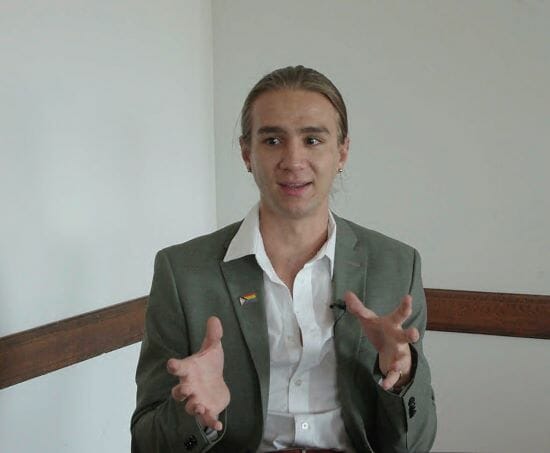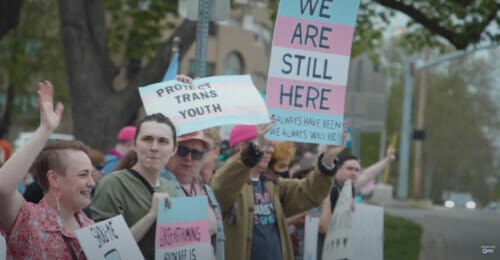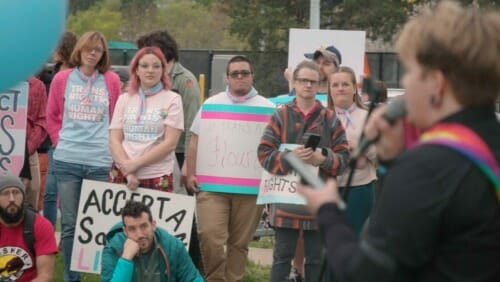- Home | News & Issues |
- How Can We Protect Safe Spaces and LGBTQ+ People in Kansas City?
How Can We Protect Safe Spaces and LGBTQ+ People in Kansas City? Activists Speak Out After Two Pellet Gun Shootings at Fountain Haus
Published August 8th, 2023 at 6:00 AM
Above image credit: Fountain Haus, a new LGBTQ+ friendly bar in Westport, has been the scene of pellet gun incidents in recent months. (Grace Hills | Flatland)Laughter was in the air at the corner of Westport and Broadway, as it often is on weekend nights. Dakota Allen, an LGBTQ+ activist, stood in line outside of Fountain Haus – the newest LGBTQ+ friendly bar in town.
Suddenly, the laughter was drowned out by an engine revving and people screaming.
A discharge from a pellet gun grazed Allen’s neck.
“In my mind, I flash back to the testimonies of people who have experienced something more serious – where they say you didn’t know at first what hit you. You just felt something hit you, and saw people around you reacting and heard the screaming. That was what happened around me,” Allen said.

In the wake of anti-LGBTQ+ legislation being passed in both Kansas and Missouri, concerns about an increase in hate crimes echo in the LGBTQ+ community.
Those concerns became a reality when Fountain Haus was the target of the drive-by pellet gun shooting in early May. The shooting occurred about the time two anti-transgender bills passed the Missouri General Assembly – banning gender-affirming care for minors and trans children participating in a sport consistent with their gender identity.
In early June, another pellet gun shooting occurred at Fountain Haus – at the same place, targeting the same community – three days before Missouri Gov. Mike Parson signed those same anti-trans bills into law.
“Thank goodness nobody was hurt, but considering our proximity to Pride next weekend we must consider this a threat that can escalate,” a Fountain Haus official said in an email to Justice Horn, chair of the LGBTQ+ Commission for Kansas City. Fountain Haus officials declined comment for this story.
A direct correlation between such hate crimes and anti-LGBTQ+ legislation is difficult to draw, since many states do a poor job reporting hate crimes. Notably, Florida reported just one hate crime in 2021. Nationwide, 8,530 hate crimes were reported.
Even so, a number of studies and conversation among the community suggest hateful legislation can empower hateful people.
“It creates an environment where hysteria and conspiracy spreads,” Horn said.
How Can We Protect LGBTQ+ Spaces?
Seventy-four percent of adults who do not support trans rights do not know a trans person, according to a survey by Just Like Us. According to the University of California Los Angeles, 0.5% of adults identify as trans.
And while it’s not the burden of trans people to introduce themselves to every anti-trans person, the gradual increase of trans people in the population may lead to a gradual increase in trans rights support. According to the Just Like Us study, if you know a trans person you’re twice as likely to be an ally.
Horn believes lots of this hate comes from not understanding. He believes the anti-trans train of thought goes, “I want to snuff this out of existence because I do not get it and that scares me.”
Despite growing acceptance of gay and lesbian people, simply because more people have come out of the closet, advocates say there are ways to accelerate the process.
One thing Horn points to is the creation of an LGBTQ+ business district, or neighborhood. Though Kansas City has many LGBTQ+ supportive and owned spaces, they’re scattered throughout the city.
“There is a need for us to build that in Kansas City, so we can have somewhere people can go if they were just kicked out of their house,” Horn said. “Where can people go if they’re from out of town and just want to find community?”
“I think the best thing we can do is to continue to community build, facilitate and empower folks. I think our city will be okay. We’re a city that’s going to fight for you.”
Justice Horn, chair of the LGBTQ+ Commission for Kansas City
Think Boystown in Chicago, or West Hollywood Los Angeles. Those are neighborhoods that give LGBTQ+ people the safety and power to come out. Horn also pointed to cities that have decriminalized sex work as model cities.
“A big portion, not all, of our trans siblings do sex work,” Horn said. “Like many other cities, we need to decriminalize sex work. That not only protects them, but it views their work as work, and also views workers as having rights.”
Nine out of ten transgender sex workers, or those suspected of being a sex worker, say they’ve been harassed. While the logistics behind decriminalizing sex work can be sticky – like figuring out which municipality would enforce it, and how to prevent human trafficking – studies show that decriminalizing sex work would lead to safer working conditions for sex workers.
Finding New Spaces
After the two pellet gun shootings, Kansas City strengthened security at the city’s Pride parade. Nobody was physically hurt at Pride.
One consequence of hate crimes is that they bring visibility to the community and how they respond. For example, local bar Missie B’s raised over $53,000 to support the victims of the 2016 Pulse nightclub shooting in Florida, where 49 people were killed.
Bars aren’t the only spaces for the community. Horn found his first safe space in a Gay Straight Alliance classroom in middle school. Allen found one in the Rainbow Room at the University of Missouri-Kansas City.
“We only have so many safe spaces to exist in,” Allen said. “And when those spaces exist in a specific kind of experience, it’s difficult to come in and discuss politics.”
Allen believes the creation of new safe spaces – ones that are not centered around alcohol but rather conversation – can lead to protection. The community sets the tone for how they respond to things like hate crimes, and creating a clear message that the community won’t accept that is protection.
“I think the best thing we can do is to continue to community build, facilitate and empower folks. I think our city will be okay,” Horn said. “We’re a city that’s going to fight for you.”
Hear More: Dakota Allen Discusses Safe Spaces in KC
Grace Hills is a University of Kansas journalism student and summer intern at Kansas City PBS.
More on Flatland
‘Transas City’: KC Offers Sanctuary Amid Anti-Trans Push A loud clatter of skateboards, abandoned by riders grinning at a near wipeout, interrupts conversations among friends and new acquaintances. It’s the first time Late-Nite Bite, a monthly sober and queer event, has set up shop at Goofball Sk8boards…
Pondering KC’s Quest to Become a Transgender ‘Safe Haven’ Kansas City’s quest to become a “safe haven” in the wake of anti-transgender legislation in Missouri turns on raw politics and vexing legal questions.
Like what you are reading?
Discover more unheard stories about Kansas City, every Thursday.
Thank you for subscribing!
Check your inbox, you should see something from us.
Ready to read next




